It's been a rough few months for Google in Europe. Not only has the European Union hit the company with a second antitrust investigation, but - in a move that has received less press, but could have wider consequences - French regulators have pushed it to restrict search results all over the world to comply with their "right to be forgotten" privacy laws.
That's a problem for a company whose business model is built on search. But it may be an even bigger problem for Internet users. If a European government can control what people all over the world get to see on the Internet, why can't every other country do the same?
The back-and-forth between Europe and Google is the latest fallout from a 2014 ruling from Europe's highest court that gave people broad rights to make search engines remove search results about themselves, including links to news articles and other information. People with connections to Europe can file requests with Google to have certain links removed from search results.
Google responded by taking search results out of its European versions: Visitors to google.fr or google.de wouldn't see the banned results, but they were still there on google.com. Still, Europeans could navigate to the company's non-European versions. Last month, French regulators fined the company and said these steps were not enough. Technically, the French may have a point. When Europeans type "google.com" into their browsers, Google directs them to their national versions of the service - which, it says, are used by 95 per cent of its European users. But Google hadn't erected barriers to stop those people from visiting google.com.

In a concession to regulators, Google is changing that now, using "geo-blocking" technology to control what European users can see. Under the new system, Google will not only remove links on, say, google.fr, but it will also block users in France from seeing those links on any other Google country site, or google.com itself. Unless they use tools like virtual private networks to disguise their locations, users in those countries will see pruned search results.
Some say this is a logical solution - avoiding global deletion while letting a sovereign state enforce its laws within its borders. But it is a big step away from the Internet's promise of universally accessible information, and a big step towards a world of "splinternets". There are several problems with this.
Chopping up important parts of the Web raises barriers to entry for anyone looking to set up online, from independent bloggers to non-governmental organisations to businesses. Smaller online services are unlikely to build bespoke French versions, as Google has done. It is easier and cheaper to block French users entirely. That means new entrants miss out on the French market, French Internet users miss out on new content and technologies from abroad, and everyone everywhere misses out on the creativity and innovation that comes from participating in a global Internet.
Walling off national Internet sectors also lends legitimacy to countries like China, Turkey and Iran that have long controlled what information their citizens can view online. Just this month, the US Trade Representative made waves by identifying one such blocking system, China's so-called Great Firewall, as a barrier to trade.
News outlets should have particular cause for alarm about geo-blocking. Journalists rely on global networks to investigate and report on international stories, like the recent Panama Papers revelations. They themselves are often the first targets when governments seek to control the flow of information to their citizens. Protection exists in the EU privacy law for journalistic activities, so the news media is not directly in the cross hairs of the "right to be forgotten". But American news organisations have faced libel actions in hostile foreign courts - and when plaintiffs start asking for geo-blocking in those cases, journalists will be on the front lines.
Privacy is a real issue and shouldn't be ignored in the Internet age. But applying those national laws to the Internet needs to be handled with more nuance and concern. These developments should not be driven only by privacy regulators. State departments, trade and justice ministries and telecommunications regulators in France and other European countries should be demanding a place at the table. So should free-expression advocates.
One day, international agreements may sort this all out. But we shouldn't Balkanise the Internet in the meantime. Once we've erected barriers online, we might not be able to tear them down.
NEW YORK TIMES
• Daphne Keller is the director of intermediary liability at the Stanford Centre for Internet and Society and a former associate general counsel for Google. Bruce D. Brown is the executive director of the Reporters Committee for Freedom of the Press.
Chopping up important parts of the Web raises barriers to entry for anyone looking to set up online, from independent bloggers to non-governmental organisations to businesses. Smaller online services are unlikely to build bespoke French versions, as Google has done. It is easier and cheaper to block French users entirely.
